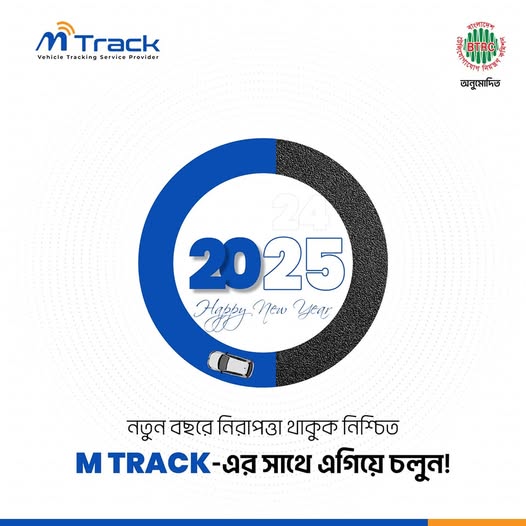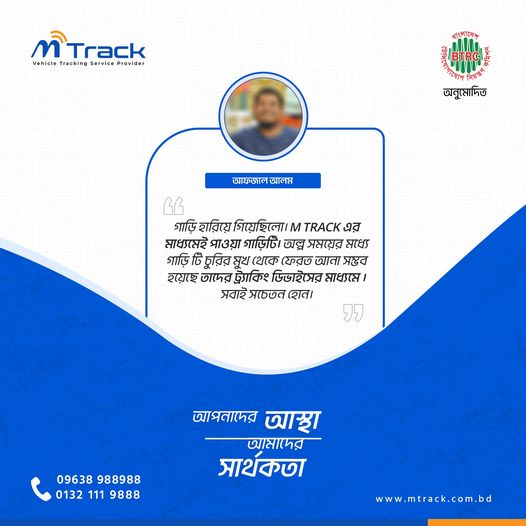GPS tracking is essential in fleet management for avoiding costly fines by ensuring regulatory compliance, preventing speeding violations, maintaining vehicle health, optimizing route planning, and providing accurate reporting. By leveraging GPS tracking technology, fleet managers can effectively monitor and manage their vehicles, leading to a more efficient and legally compliant operation that minimizes the risk of expensive penalties.
1. Compliance with Regulatory Requirements
Government regulations BTRC authorized M Track vehicle GPS Tracking System often mandate specific operational standards for commercial vehicles. GPS tracking systems can monitor and ensure compliance with these regulations, such as Hours of Service (HOS) rules. By keeping accurate records of driving hours, rest breaks, and routes, fleet managers can easily produce documentation during inspections, thereby avoiding fines related to non-compliance.
2. Preventing Speeding Violations
Speeding is a common cause of traffic fines, and for Fleet Management operators, it can lead to significant expenses. GPS tracking systems allow fleet managers to set speed limits and receive alerts when a vehicle exceeds them. By monitoring driver behavior in real-time, fleet managers can take immediate action to prevent speeding violations, thereby reducing the risk of fines.
3. Monitoring Vehicle Maintenance
Neglecting vehicle maintenance can result in mechanical failures and accidents, both of which can lead to hefty fines. GPS tracking systems often come with maintenance scheduling features that remind fleet managers of upcoming service needs. Keeping vehicles in top condition not only ensures safety but also helps avoid fines related to breakdowns or non-compliance with safety standards.
4. Improving Route Planning and Reducing Idle Time
Inefficient route planning can lead to unnecessary fuel consumption and increased idle time, both of which may incur fines, especially in areas with anti-idling laws. GPS tracking enables Fleet Management to optimize routes, reduce idle time, and minimize fuel usage. This not only cuts costs but also helps avoid fines related to environmental regulations.
5. Ensuring Accurate Reporting
Accurate reporting is essential in fleet management to avoid discrepancies that could lead to fines. GPS tracking systems automatically log data such as mileage, speed, and route details, ensuring that all reports are precise and up-to-date. This reduces the risk of errors in documentation, which could otherwise result in costly fines.
The Role of GPS Tracking in Fleet Sustainability
GPS tracking plays a crucial role in fleet management by enhancing sustainability through optimized route planning, reduced fuel consumption, lower emissions, and improved vehicle maintenance.
As companies increasingly prioritize sustainability, GPS tracking has become a vital tool in fleet management strategies. Here’s how GPS tracking contributes to a more sustainable fleet:
1. Optimized Route Planning
One of the primary ways GPS tracking supports fleet management sustainability is through optimized route planning. By analyzing traffic patterns, road conditions, and distance, GPS systems help fleet managers design the most efficient routes. This reduces unnecessary mileage, lowers fuel consumption, and decreases the overall carbon footprint of the fleet.
2. Reducing Fuel Consumption
Fuel efficiency is a significant factor in fleet sustainability. GPS tracking systems monitor driving behaviors such as speeding, harsh braking, and excessive idling, all of which contribute to higher fuel usage. By providing real-time feedback to drivers and enabling fleet managers to address inefficient driving habits, GPS tracking helps reduce fuel consumption, which is both cost-effective and environmentally friendly.
3. Lowering Emissions
With optimized routes and improved driving behaviors, fleet Management can significantly reduce their greenhouse gas emissions. Lower emissions not only contribute to a cleaner environment but also help companies meet regulatory requirements and sustainability goals. GPS tracking systems provide the data needed to measure and report on emission reductions, allowing companies to track their progress toward sustainability targets.
4. Improving Vehicle Maintenance
Regular vehicle maintenance is key to ensuring that a fleet Management operates efficiently and sustainably. GPS tracking systems often include maintenance scheduling features that alert fleet managers when vehicles require servicing. By keeping vehicles in optimal condition, companies can reduce emissions from poorly maintained engines, avoid breakdowns that lead to wasteful detours, and extend the lifespan of their vehicles.
5. Encouraging Eco-Friendly Driving Practices
GPS tracking systems can be used to promote eco-friendly driving practices by monitoring and providing feedback on driver performance. Encouraging behaviors like smooth acceleration, consistent speed, and minimal idling contribute to lower fuel consumption and emissions, supporting the overall sustainability of the fleet.
Why GPS Tracking is a Game-Changer for Courier Services
GPS tracking is a game-changer for courier services in fleet management, offering real-time visibility, optimized route planning, improved delivery times, enhanced customer service, and cost savings.
In the highly competitive courier industry, where timely deliveries and operational efficiency are paramount, GPS tracking has revolutionized how courier services manage their fleets. Here’s why it’s so impactful:
1. Real-Time Visibility
GPS tracking provides courier services with real-time visibility into the location and status of their vehicles. Fleet managers can monitor each vehicle’s progress, track deliveries, and quickly respond to any issues or delays. This level of transparency helps ensure that packages are delivered on time, enhancing overall efficiency and reliability.
2. Optimized Route Planning
Efficient route planning is critical for meeting delivery deadlines and reducing operational costs. GPS tracking systems analyze traffic conditions, road closures, and the most efficient routes, allowing courier services to avoid delays and reduce travel time. This not only speeds up deliveries but also minimizes fuel consumption, contributing to cost savings and environmental sustainability.
3. Improved Delivery Times
With real-time data and optimized routing, courier services can significantly improve their delivery times. GPS tracking helps drivers avoid traffic congestion and take the fastest routes, ensuring that packages reach their destinations quickly. Faster deliveries lead to higher customer satisfaction and can give courier services a competitive edge in the market.
4. Enhanced Customer Service
GPS tracking enables courier services to provide customers with accurate delivery estimates and real-time tracking updates. Customers can see exactly where their package is and when it will arrive, improving transparency and trust. This enhanced customer experience can lead to higher retention rates and positive reviews, further boosting the courier service’s reputation.
5. Cost Savings
By optimizing routes, reducing fuel consumption, and minimizing delays, GPS tracking helps courier services cut costs across their operations. These savings can be reinvested into the business, allowing for growth and the ability to offer more competitive pricing to customers. Additionally, improved efficiency reduces wear and tear on vehicles, lowering maintenance costs over time.
The Impact of GPS Tracking on Employee Accountability
GPS tracking significantly enhances employee accountability in fleet management by providing real-time monitoring, encouraging responsible driving, reducing unauthorized usage, and improving overall productivity.
In fleet management, employee accountability is critical to ensuring that operations run smoothly and efficiently. GPS tracking has become a powerful tool for promoting accountability among drivers and other fleet personnel. Here’s how it makes a difference:
1. Real-Time Monitoring
GPS tracking systems offer real-time monitoring of vehicle locations, speeds, and routes. Fleet managers can see exactly where each vehicle is at any given moment, which discourages unauthorized stops or detours. Knowing that their movements are being tracked, employees are more likely to stay on task and follow assigned routes, leading to greater accountability and efficiency.
2. Encouraging Responsible Driving
With GPS tracking, fleet managers can monitor driving behaviors such as speeding, harsh braking, and rapid acceleration. By identifying and addressing these behaviors, companies can encourage safer, more responsible driving. Employees are more likely to follow safety protocols and drive within legal limits when they know their actions are being recorded, reducing the risk of accidents and associated costs.
3. Reducing Unauthorized Vehicle Usage
Unauthorized vehicle usage, whether for personal errands or other non-work-related activities, can be a significant issue in fleet management. GPS tracking allows managers to detect and prevent such activities by monitoring vehicle usage patterns. When employees know that their vehicle usage is being tracked, they are less likely to use company vehicles for unauthorized purposes, leading to better resource management and reduced operational costs.
4. Improving Productivity
GPS tracking systems can help identify inefficiencies in fleet operations, such as excessive idling, long breaks, or unproductive time spent on the road. By analyzing this data, fleet managers can implement measures to improve productivity, such as optimizing routes or adjusting schedules. Employees are more accountable for their time when they know their performance is being monitored, leading to more effective use of resources and higher overall productivity.
5. Enhanced Transparency and Trust
By providing clear, objective data on employee performance, GPS tracking fosters a culture of transparency and trust within the organization. Employees understand that their performance is being evaluated based on real data, which can lead to fairer assessments and more constructive feedback. This transparency can also improve communication between management and staff, further enhancing accountability.
How to Choose the Right GPS Tracking Provider for Fleet Management
Choosing the right GPS tracking provider is crucial for effective fleet management, as it impacts real-time monitoring, data accuracy, customer support, scalability, and overall cost-efficiency.
Selecting a GPS tracking provider for your fleet is a significant decision that can greatly influence the efficiency and effectiveness of your fleet management strategy. Here’s a guide to help you make the right choice:
1. Assess Your Fleet’s Needs
Before choosing a provider, evaluate your specific fleet management needs. Consider factors such as the size of your fleet, types of vehicles, and your primary objectives (e.g., real-time tracking, route optimization, maintenance alerts). Understanding these needs will help you select a provider that offers the features most relevant to your operations.
2. Evaluate Features and Functionality
Different GPS tracking providers offer various features. Key functionalities to look for include real-time tracking, route optimization, driver behavior monitoring, maintenance alerts, and customizable reporting. Ensure that the provider’s features align with your fleet management goals and provide the tools you need for effective management.
3. Consider Data Accuracy and Reliability
Data accuracy is critical for making informed decisions and managing your fleet effectively. Research the provider’s technology to ensure it offers reliable and accurate tracking data. Look for providers with a track record of high uptime and dependable performance to avoid issues with data reliability.
4. Review Customer Support and Service
Quality customer support is essential for resolving issues and maximizing the benefits of your GPS tracking system. Choose a provider with a reputation for excellent customer service, including responsive support teams, comprehensive training, and accessible resources. Good support ensures that any problems or questions can be addressed quickly and effectively.
5. Examine Scalability and Integration
As your fleet grows or your needs change, your GPS tracking system should be able to scale accordingly. Look for providers that offer scalable solutions and can integrate with other fleet management tools or software you may already be using. This flexibility ensures that your tracking system can evolve with your business.
6. Compare Costs and Pricing Models
Cost is an important consideration, but it should be weighed against the value and features provided. Compare pricing models, including upfront costs, monthly fees, and any additional charges for extra features or support. Ensure that the provider offers transparent pricing and provides a good balance between cost and functionality.
7. Read Reviews and Seek Recommendations
Research customer reviews and seek recommendations from other fleet managers to gauge the provider’s reputation and reliability. Insights from other users can provide valuable information about the provider’s performance, customer service, and overall satisfaction.
Conclusion
Choosing the right GPS tracking provider is a critical step in effective fleet management. By assessing your fleet’s needs, evaluating features, considering data accuracy, reviewing customer support, examining scalability, comparing costs, and seeking recommendations, you can select a provider that best aligns with your requirements and enhances your fleet’s efficiency and performance.



